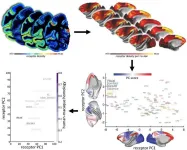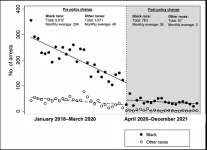(Press-News.org) Weak policies and political ideologies risk jeopardising plans to tackle health and climate change, says Cambridge expert
Efforts to tackle major issues facing the UK, including the nation’s health and climate change, are being hampered because politicians often ignore the existing evidence when setting policies, according to Dame Theresa Marteau, a public health expert at the University of Cambridge.
Writing in the journal Science and Public Policy, Professor Marteau argues that this ‘evidence-neglect’ is a result of incentive structures that encourage politicians to set ambitious policy goals while simultaneously disincentivising them from implementing the policies needed to achieve them, and of political ideologies and interests that conflict with effective policies.
Two changes could mitigate these factors, writes Professor Marteau: engaging citizens more in policy-making so their interests dominate; and increasing the accountability of politicians through legally binding systems for all stages of policy-making.
Recent UK governments have set ambitious goals to improve the nation’s health and tackle climate change. These include halving childhood obesity by 2030, eradicating smoking by 2030, narrowing the gap in healthy life expectancy by 2030, and achieving net zero carbon emissions by 2050.
But, says Professor Marteau, Director of the Behaviour and Health Research Unit at Cambridge, “None of these ambitions is on course. Of course, scientific evidence is just one of many sources of information for policymakers to consider, but neglecting evidence is a sure-fire route to unsuccessful policymaking.”
According to predictions, childhood obesity is on track to double, not halve, by 2030. Smoking eradication is on track sometime after 2050, not by 2030. By 2030, the gap in healthy life expectancy between local areas where it is highest and lowest will have narrowed, but by 2035 is set to rise by five years. And the UK Sixth Carbon Budget – a key target towards achieving net zero carbon emissions – is likely to be missed by “a huge margin”.
Achieving each of these ambitions requires sustained changes in several sets of behaviour across all socio-economic groups including what we eat, drink, whether we smoke, and how we travel. A wealth of research demonstrates that achieving such change is difficult, requiring many interventions that change the environments or systems that too readily cue, reinforce and maintain unhealthier and unsustainable behaviours.
“There are many possible reasons why these policy ambitions are so far off-track, but chief among them is the neglect of evidence, particularly around achieving sustained changes in behaviour across populations,” said Professor Marteau.
“Put simply, these failures are baked-in, given the policies designed to achieve these ambitions are based on interventions that cannot achieve the change required.”
Part of the problem, she says, lies in the incentive structures for politicians, which favour setting ambitious policy goals whether as part of achieving election promises, attracting positive publicity or both. But they also discourage the policies needed to achieve them.
“Fear of electoral damage plays a role here. Take taxes on tobacco, alcohol, junk food and carbon emissions: these are among the most effective interventions for improving health and the climate, but they are unpopular with the public and so politicians are unwilling to adopt them.”
Such policies may not just be unpopular with the public – they may also run counter to political interests and ideologies. Neoliberalism, for example, emphasises a small role for governments in the economy and public policy more generally, and a larger role for individuals to be personally responsible for behaving in ways to achieve health, wealth and happiness. Such ideologies often portray attempts by the government to intervene as ‘Nanny Statism’.
Certain industries, too, focus on personal responsibility to discourage politicians from adopting effective policies that conflict with their industries’ interests, such as those aimed at reducing consumption of fossil fuels, tobacco, alcohol, meat and junk food. These industries may cast doubt on the effectiveness of policies that would reduce their sales, as well as lobbying governments to persuade them of the business case for the status quo.
Professor Marteau added: “There are no quick or single fixes to overcoming these problems, but there are two changes which could help: engaging citizens more in priority setting and policy design, and increasing the accountability of politicians through introducing legally-binding systems for reporting progress on policy ambitions.”
There are a number of options available to policymakers when it comes to engaging citizens, including: surveys, focus groups, town hall meetings and citizen assemblies, as well as working with civil society organisations. This approach has the potential to reduce the political costs of unpopular policies by exposing citizens to evidence for the effectiveness of policies, which – across many studies – has been shown to increase policy support. Policies designed with citizen engagement also attract more public support, such policies being seen as fairer and more successful as a result.
Introducing legally binding systems for reporting policies and progress on policy ambitions, with plans to get back on track if progress is off course, could be a powerful way to decrease the neglect of evidence which is central to policy success.
An example of this is the UK government’s recent Levelling Up strategy paper, which included plans to introduce a statutory obligation for government to report annually on progress towards meeting the Levelling Up missions. Alongside these plans, it published a set of metrics against which to measure progress against the missions and evaluate the success of the strategy.
“Although these requirements are by no means perfect, the legislation as drafted will at least allow parliament significantly more scrutiny of progress towards a government ambition than is often the case.”
Failure to take into account the evidence, says Professor Marteau, risks undermining the government’s attempts to take action.
“Laudable policy ambitions to improve a nation’s health and protect life on the planet will remain unfulfilled ambitions unless and until evidence is given a more central role in the policy-making process.”
Reference
Marteau, TM. Evidence-neglect: addressing a barrier to UK health and climate policy ambitions. Science and Public Policy; 20 June 2023; DOI: 10.1093/scipol/scad021
END
Weak policies and political ideologies risk jeopardizing plans to tackle health and climate change, says Cambridge expert
2023-06-20
ELSE PRESS RELEASES FROM THIS DATE:
Low-dose aspirin use associated with 20% increased anemia risk in older adults
2023-06-19
1. Low-dose aspirin use associated with 20% increased anemia risk in older adults
Abstract: https://www.acpjournals.org/doi/10.7326/M23-0675
URL goes live when the embargo lifts
An analysis of the ASPREE (ASPirin in Reducing Events in the Elderly) trial found that the use of low-dose aspirin was associated with a 20 percent increased incidence of anemia and decline in ferritin, or blood iron levels, in otherwise healthy older adults. These findings suggest that periodic monitoring of hemoglobin should be considered in older patients taking aspirin. The analysis is published in Annals ...
Chinese paleogeneticist FU Qiaomei awarded UNESCO–AI Fozan International Prize for the Promotion of Young Scientists
2023-06-19
FU Qiaomei, a paleogeneticist at the Chinese Academy of Sciences (CAS), received the UNESCO–AI Fozan International Prize for the Promotion of Young Scientists in Science, Technology, Engineering and Mathematics (STEM) on June 19 in Paris, France, for her “seminal work on the history of early humans in Eurasia, based on genetic lineage studies, which provides new insights on the early human history of Eurasia and perspectives on the evolution of human health.”
She was one of five young scientists from around the world to receive the prize, alongside researchers from Argentina, Cameroon, Egypt, and Serbia. The laureates were ...
Clean, sustainable fuels made ‘from thin air’ and plastic waste
2023-06-19
Researchers have demonstrated how carbon dioxide can be captured from industrial processes – or even directly from the air – and transformed into clean, sustainable fuels using just the energy from the Sun.
The researchers, from the University of Cambridge, developed a solar-powered reactor that converts captured CO2 and plastic waste into sustainable fuels and other valuable chemical products. In tests, CO2 was converted into syngas, a key building block for sustainable liquid fuels, and plastic bottles were converted into glycolic acid, which is widely used in the cosmetics industry.
Unlike earlier tests ...
Human Brain Project study offers insights into neuroreceptor organization
2023-06-19
A key challenge in neuroscience is to understand how the brain can adapt to a changing world, even with a relatively static anatomy. The way the brain’s areas are structurally and functionally related to each other – its connectivity – is a key component. In order to explain its dynamics and functions, we also need to add another piece to the puzzle: receptors. Now, a new mapping by Human Brain Project (HBP) researchers from the Forschungszentrum Jülich (Germany) and Heinrich-Heine-University Düsseldorf (Germany), in collaboration with scientists from the University of Bristol (UK), ...
These long-necked reptiles were decapitated by their predators, fossil evidence confirms
2023-06-19
In the age of dinosaurs, many marine reptiles had extremely long necks compared to reptiles today. While it was clearly a successful evolutionary strategy, paleontologists have long suspected that their long-necked bodies made them vulnerable to predators. Now, after almost 200 years of continued research, direct fossil evidence confirms this scenario for the first time in the most graphic way imaginable.
Researchers reporting in the journal Current Biology on June 19 studied the unusual necks of two Triassic ...
Brain receptor patterns separate sensory and cognitive networks, new study finds
2023-06-19
Receptor patterns define key organisational principles in the brain, scientists have discovered.
An international team of researchers, studying macaque brains, have mapped out neurotransmitter receptors, revealing a potential role in distinguishing internal thoughts and emotions from those generated by external influences.
The comprehensive dataset has been made publicly available, serving as a bridge linking different scales of neuroscience - from the microscopic to the whole brain.
Lead author Sean Froudist-Walsh, ...
A new tool to study complex genome interactions
2023-06-19
People who owned black-and-white television sets until the 1980s didn’t know what they were missing until they got a color TV. A similar switch could happen in the world of genomics as researchers at the Berlin Institute of Medical Systems Biology of the Max Delbrück Center (MDC-BIMSB) have developed a technique called Genome Architecture Mapping (“GAM”) to peer into the genome and see it in glorious technicolor. GAM reveals information about the genome’s spatial architecture that is invisible to scientists using solely Hi-C, a workhorse tool developed in 2009 to study DNA interactions, reports a new study in Nature Methods by the Pombo lab.
“With ...
Assessment of how climate scientists communicate risk shows imperfections, improvements
2023-06-19
Scientists have long struggled to find the best way to present crucial facts about future sea level rise, but are getting better at communicating more clearly, according to an international group of climate scientists, including a leading Rutgers expert.
The consequences of improving communications are enormous, the scientists said, as civic leaders actively incorporate climate scientists’ risk assessments into major planning efforts to counter some of the effects of rising seas.
Writing in Nature Climate Change, the scientists ...
De facto decriminalization of drug possession reduces the overall arrest toll on the Black community, although racial disparities persist
2023-06-19
Ann Arbor, June 19, 2023 – De facto decriminalization of drug possession may be a good first step in addressing the disproportionate impact of an overburdened United States criminal justice system on the Black community. According to a new study in the American Journal of Preventive Medicine, published by Elsevier, this strategy was associated with significant and sustained reductions in low-level arrests. These arrests too often prevent drug users from obtaining needed treatments and services. The findings also suggest that while these policies may effectively reduce the overall arrest toll, striking disparities persist in how police are applying the directives across racial ...
Combatting stress to improve the heart health of the Hispanic/Latino community
2023-06-19
Embargoed until 8am Eastern Time on Monday, June, 19, 2023
DALLAS, June 19, 2023 — Constant or chronic stress can affect overall well-being and may even impact heart health. Chronic stress can lead to increased blood pressure, heart rate and inflammation, which can contribute to developing chronic diseases.[1] The American Heart Association, the leading global voluntary health organization dedicated to fighting heart disease and stroke for all, today launches a new campaign to help the Hispanic/Latino community protect its overall well-being by addressing common stressors that ...





